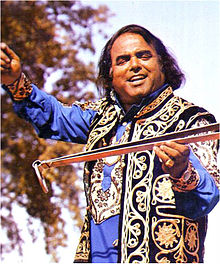Alam Lohar
| Alam Lohar | |
|---|---|
 |
|
| Background information | |
| Birth name | Muhammad Alam Lohar |
| Born | 1928 Lalamusa, Punjab, British India (now in Pakistan) |
| Died |
3 July 1979 (aged 51) Sham ki Bhattian, Punjab, Pakistan |
| Genres | Punjabi folk music |
| Occupation(s) | Singer, musician, poet |
| Instruments | Chimta |
| Years active | 1936–1979 |
| Labels | EMI Music Pakistan, Oriental Star Agencies |
Alam Lohar (Urdu: محمد عالم لوہار, Punjabi: ਆਲਮ ਲੋਹਾਰ; 1928 – 3 July 1979) was a prominent Punjabi folk music singer from the Punjab region of Pakistan, formerly British India. He is credited with popularising the musical term Jugni.
Early life: Alam Lohar was born in 1928 in Achh, a village in Kharian Tehsil, Gujrat District of Punjab, British India. He was born into a family of blacksmiths. As a child, Lohar read Sufiana Kalaam, a collection of Punjabi stories and poetry and started singing from a childhood age. His family and children now live all around the world with most of his children in the UK.
Alam Lohar developed a new style of singing the Punjabi Vaar, an epic or folk tale which made him popular when he toured villages and towns in the Punjab region. He is famous for his rendition of Waris Shah's Heer along with other songs such as Saif-Ul-Malook. He recorded his first album at the age of 13 and has outsold all other singers in Pakistan at the time (Verified in records kept with HMV Pakistan 1979).
In his childhood he used to read sufiana kalaams, Punjabi stories and participate as a young child in local elderly gatherings expressing a vocal only art form in reading passages of great poets. From many of the gatherings out of the rural background rose a great singer that could influence his audience with elements of joy peace, happiness and sadness. Further he started going to festivals and gatherings on a regular basis and within these performances he rose to become one of the most listened to singers in South Asia during the 70s.
In the 1970s Alam Lohar started to tour different countries including United Kingdom, Canada, Norway, United States and Germany for the South Asian communities.
Alam Lohar died in an accident near Sham ki Bhattian on 3 July 1979 when a heavily loaded truck collided with his vehicle because the truck failed to overtake his car. He was buried at the outskirts of Lalamusa in Pakistan. Upon the news of his death, the President of Pakistan Muhammad Zia-ul-Haq honoured Alam Lohar with Pakistan's highest civil award for arts and theatre the Pride of Performance Award in the same year.
...
Wikipedia
